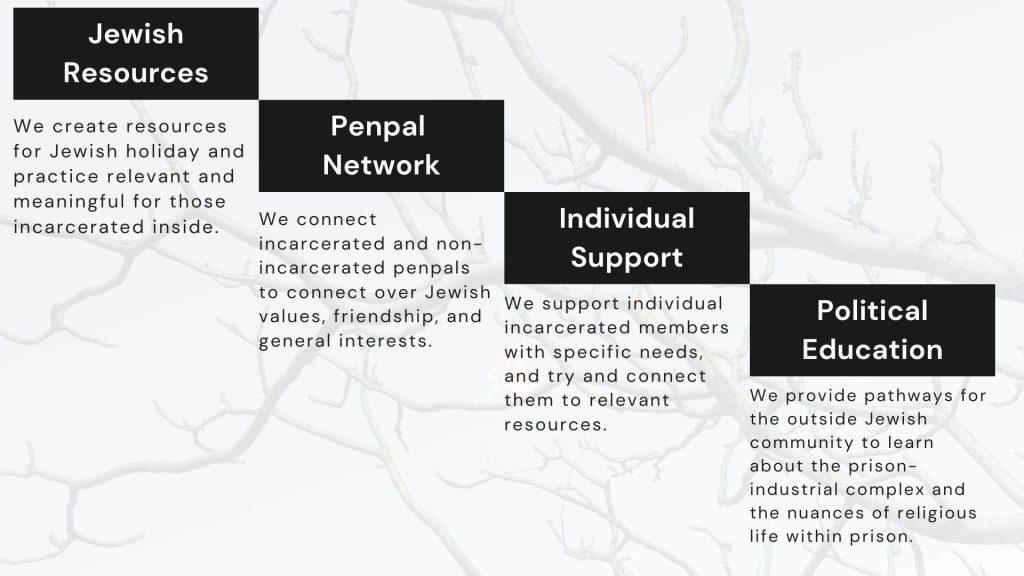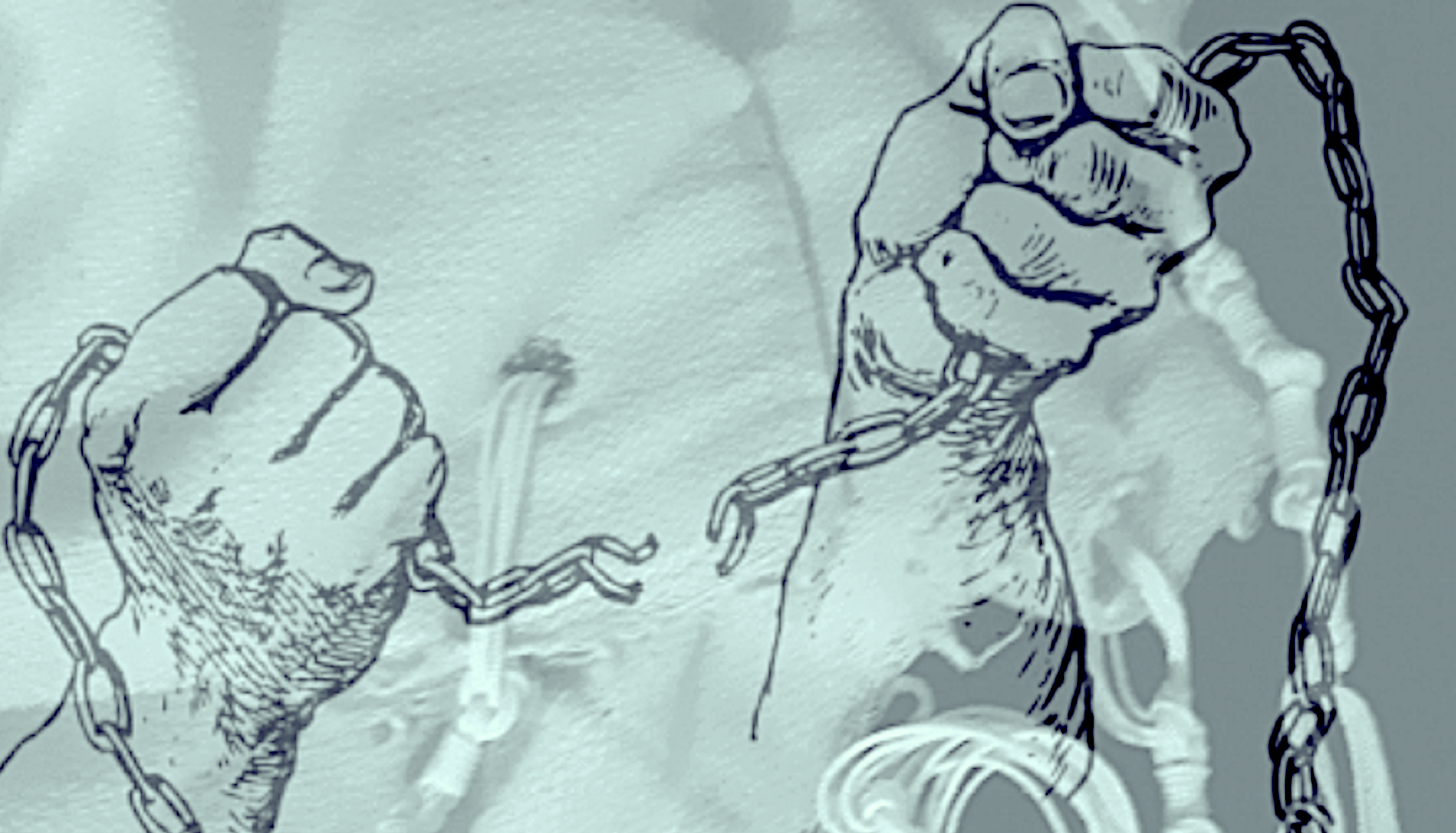Who We Are/Purpose
Vision/Belief
Guiding Jewish Concepts
What We Do
Who We Are
We are a collection of Chaplains, Rabbis, Cantors, Kohanot/Hebrew Priestesses, advocates, activists, volunteers, loved ones of incarcerated people, and people with direct experience of incarceration. We are an all volunteer group who began meeting in 2021. We live and work across Turtle Island, in territories, cities, and rural settings of the US and Canada.
Purpose
Matir Asurim: Jewish Care Network for Incarcerated People connects Jewish spiritual, cultural, and communal resources to people who have experienced incarceration.
Matir Asurim literally translates as “The One Who Frees Captives.” This phrase from Jewish liturgy refers to God’s power to act for freedom and/or humanity’s ability to manifest godliness through working for freedom.
Vision
We are striving toward a world free from oppression, where aspects of social identity like race, class, and gender no longer limit our safety, opportunities, and agency to live into the fullness of our sacred potential.
We are striving toward a world where individuals are mutually accountable to one another and where wrongdoing is addressed through reparative and transformative justice, guaranteeing the human dignity of all parties.
We are striving toward a world where all people are provided with the conditions for healing trauma and for teshuvah (repentance/restoration), surrounded by resources, guidance, and social support networks.
We are striving toward a world where nobody is isolated and everyone has opportunities to connect to something larger than ourselves—whether to community, culture, or spirituality. Within that world, we envision a Judaism that is radically welcoming and accessible to all seekers.
We Believe
Incarceration does not keep our communities healthy and safe. Mass incarceration disproportionately impacts Black and Indigenous people, people of color, queer and trans people, immigrants, disabled people, and poor and working class people. To fight for a world where prisons are obsolete is to fight all systems of oppression.
Incarceration cuts individuals off from the social, cultural, spiritual, and educational supports they need and deserve as human beings. While people are incarcerated, those on the outside must ensure they are provided with opportunities to explore their religious traditions as part of the rights and dignities that befit their humanity.
We know that incarcerated people have incredible Torah to share and are essential members of our Jewish communities. All Jewish communities will be strengthened by creating more connections across prison walls. We believe that people who are directly impacted by mass incarceration are the visionaries and leaders of all anti-carceral work.
Guiding Jewish Concepts
- B’tzelem Elokim [divine image]: All people are created in the image of the Divine. We all carry a spark of divine goodness as well as the capacity for creative action and transformation.
- SOURCE TEXT: וַיִּבְרָא אֱלֹהִים אֶת-הָאָדָם בְּצַלְמוֹ, בְּצֶלֶם אֱלֹהִים בָּרָא אֹתוֹ: זָכָר וּנְקֵבָה, בָּרָא אֹתָם
- “And God created humankind in the divine image. In the image of God did the Divine create them.” — Genesis 1:27. More on MA and Btzelem Elohim
- Teshuva [repentance/return]: We believe in human resilience and transformation, in our ability to make amends after experiencing and/or perpetrating harm. We practice this relationally as conflict arises within our organizing, and also strive to create a world that uplifts restorative accountability processes rather than punishment.
- SOURCE TEXT: Text by Rebbe Nachman of Bratslav, a beloved Eastern European rabbi in the late 18th century:
- אִם אַתָּה מַאֲמִין, שֶׁיְּכוֹלִין לְקַלְקֵל, תַּאֲמִין שֶׁיְּכוֹלִין לְתַקֵּן
- “If you believe that you can damage, believe that you can repair.” — Likutei Moharan [collected teachings] Part 2:112
- Refua Shleima [Complete Healing]: We work towards collective healing and wholeness, striving to restore balanced relationships within the broader interconnected web of creation and to heal the traumatic effects of white supremacy, colonization, and other systems of oppression that affect our minds and bodies.
- SOURCE TEXT: Amidah Prayer, the oldest composed liturgy in Jewish tradition:
- רְפָאֵֽנוּ יְהֹוָה וְנֵרָפֵא הוֹשִׁיעֵֽנוּ וְנִוָּשֵֽׁעָה כִּי תְהִלָּתֵֽנוּ אָֽתָּה וְהַעֲלֵה רְפוּאָה שְׁלֵמָה לְכָל מַכּוֹתֵֽינוּ כִּי אֵל מֶֽלֶךְ רוֹפֵא נֶאֱמָן וְרַחֲמָן אָֽתָּה
- R’fa’einu, Adonai, v’neirafei
- Heal us, Adonai, and we shall be healed… More on MA and Refua Shleima
- Panim el panim [face-to-face]/Approaching: Seeking “face-to-face” interactions, despite difference, distance and bars; approaching one another as equals and striving to work in genuine relationship.
- SOURCE TEXT:
- כַּמַּיִם הַפָּנִים לַפָּנִים כֵּן לֵב־הָאָדָם לָאָדָם׃
- “As face answers to face in water, So does one person’s heart to another.” — Proverbs 27:19
- …וַיִּגַּשׁ אֵלָיו יְהוּדָה
- “Then Judah approached him… “– Genesis 44:18. More on MA and Panim El Panim
- Learning from every person: Learning from every person requires honoring the contributions and voices of people who have been systemically silenced, including through incarceration. In our conversations, we strive to hold awareness around differences in identity and power dynamics.
- SOURCE TEXT: Jewish legal text from ~200 CE, Pirkei Avot (Ethics of Our Ancestors), 4:1:
- בֶּן זוֹמָא אוֹמֵר, אֵיזֶהוּ חָכָם, הַלּוֹמֵד מִכָּל אָדָם, שֶׁנֶּאֱמַר (תהלים קיט) מִכָּל מְלַמְּדַי הִשְׂכַּלְתִּי כִּי עֵדְוֹתֶיךָ שִׂיחָה לִּי
- “Ben Zoma said: Who is wise? One who learns from every person, as it is said: ‘From all who taught me have I gained understanding’ (Psalms 119:99).”
- Kol Yisrael Aravim Zeh Bazeh [All Jews Are Responsible, One to the Other]/Communal Responsibility: “All Yisrael is responsible, one for the other.” Jews have many universalist obligations, but we also have a special duty to other Jews.
- SOURCE TEXT:
- שכל ישראל ערבים זה בזה
- “All Yisrael is responsible, one for the other.” — Shevuot 39a. More on MA and Aravim Zeh Bazeh
** These Guiding Concepts were revised in 2024. Here is the original (2021) version.
What We Do
Matir Asurim is a network designed to support and empower incarcerated folks and their loved ones, as well as chaplains working in prisons. Matir Asurim also seeks to educate communities on the outside about ways to support those affected by mass incarceration.

We welcome folks to join the network, whether they are currently incarcerated or living on the outside. We especially are looking for outside penpals to be matched with incarcerated folks. If you want to get involved with our Penpal Program, know a chaplain who would benefit from being a part of the network, or want to know about other ways to get involved in organizing Matir Asurim, please reach out to us at matirasurimnetwork@gmail.com.
If you know someone who is currently incarcerated and want to have them added to our mailing lists, feel free to email us with their details, or send them an interest form, which can be mailed to us.

